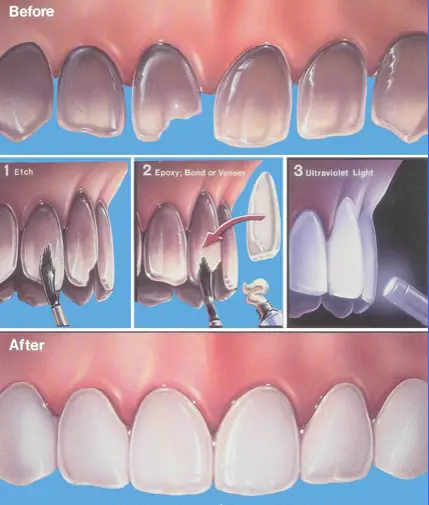Last Updated on 3 weeks by DR. ALBIN SIPES
Yes, teeth can rot under veneers if proper oral hygiene is not maintained. Veneers are thin shells placed over the front surface of teeth to improve their appearance.
However, they do not provide protection against decay. If bacteria and plaque build-up around the veneers and are not effectively removed through brushing and flossing, it can lead to tooth decay. Therefore, it is crucial to maintain good oral hygiene habits and visit your dentist regularly for check-ups and cleanings to prevent tooth rot under veneers.
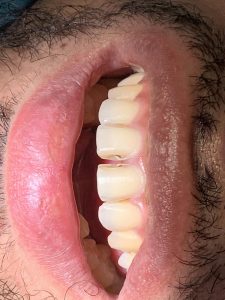
Understanding Veneers And Their Purpose
Veneers are a popular cosmetic dental treatment that can dramatically transform your smile. These thin shells, typically made of porcelain or composite materials, are custom-designed to fit over your natural teeth. They can address a range of issues such as discoloration, misalignment, and chips, ultimately giving you a bright, straight, and even smile.
Understanding what veneers are and how they enhance your smile is crucial before making a decision. So, let’s dive into the key points:
What Are Veneers?
- Veneers are thin shells made of porcelain or composite materials.
- They are custom-designed to fit over your natural teeth.
- Veneers can address issues such as discoloration, misalignment, and chips.
- They are a popular cosmetic dental treatment that can transform your smile.
-
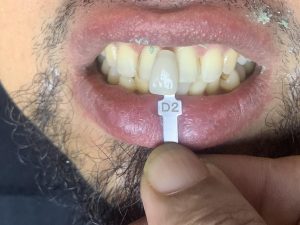
colors setting
How Do Veneers Enhance Your Smile?
- Veneers can whiten your teeth, effectively covering severe discoloration that may not respond to traditional teeth whitening methods.
- With veneers, you can achieve a straighter smile without the need for braces or orthodontic treatment.
- Chipped or broken teeth can be restored and appear seamless with the help of veneers.
- Veneers can close gaps between teeth, giving you a more even and uniform smile.
- The shape and size of your teeth can be improved with veneers, providing a harmonious and balanced smile.
Veneers are a versatile dental solution that can improve the appearance of your teeth and enhance your overall smile. Understanding the purpose and benefits of veneers allows you to make an informed decision about whether this treatment is right for you.
So why wait? Schedule a consultation with your dentist today to discover how veneers can transform your smile.
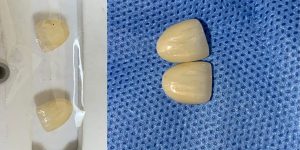
Signs Of Hidden Decay Beneath Veneers
Do your teeth rot under veneers? It’s a common concern for those considering dental veneers as a solution for enhancing their smile. While veneers can undoubtedly improve the appearance of your teeth, there is a possibility of hidden decay lurking beneath them.
We will discuss the signs of hidden decay beneath veneers and explore the potential dangers they can pose to your dental health.
The Hidden Dangers Of Decay:
- Decay can occur beneath veneers due to various reasons, such as improper placement, inadequate oral hygiene, or existing tooth decay before the veneers were applied.
- The
- Regular dental check-ups are essential to detect any decay or changes that might be occurring beneath your veneers. Your dentist will use tools like X-rays to assess the condition of your teeth and identify any hidden decay.
- If decay is left untreated, it can lead to serious dental issues such as infections, root canal problems, or even tooth loss. Therefore, it is crucial to address decay as early as possible.
- Ignoring signs of hidden decay can also result in discomfort, pain, or sensitivity in the affected tooth or teeth. This can hinder your ability to enjoy your favorite foods or engage in daily activities comfortably.
- It is essential to choose a skilled and experienced dentist for the placement of your veneers. A qualified dental professional will ensure that your teeth are thoroughly examined before the veneers are attached to minimize the risk of hidden decay.
- Maintaining proper oral hygiene practices, including regular brushing and flossing, is crucial even with veneers. Good oral hygiene helps prevent decay and keeps your natural teeth and gums healthy.
- If you notice any signs of decay, such as discoloration, dark spots, or unusual odors, it is essential to consult your dentist immediately. Ignoring these signs can lead to severe complications and further damage to your teeth.
Recognizing signs of decay under veneers:
- Discoloration: If you notice any changes in the color or shade of your veneers, it could be an indication of decay underneath. Discoloration may appear as dark spots or patches on the surface of the veneer.
- Odor: A persistent unpleasant odor coming from your veneered tooth may suggest decay. The odor is often accompanied by a foul taste in your mouth.
- Sensitivity: Increased sensitivity to hot or cold foods and beverages can be a sign that decay has developed beneath your veneers.
- Gum inflammation: Swelling, redness, or tenderness in the gums around the veneered tooth can be an indication of underlying decay or an infection.
While veneers can enhance the aesthetics of your smile, it’s crucial to be aware of the potential risks of hidden decay. Regular dental check-ups and maintaining good oral hygiene habits can help detect and address decay before it causes significant damage.
It is essential to listen to your body and consult your dentist promptly if you notice any signs of decay under your veneers. Prioritizing your dental health will not only preserve your smile but also ensure the longevity of your veneers.
Unveiling The Truth: Are Veneers A Cause Or A Cover-Up?
When it comes to embracing the perfect smile, dental veneers have become a popular choice among individuals seeking a flawless set of teeth. These thin shells of porcelain or composite resin can transform your smile, concealing imperfections and giving you the confidence to showcase your pearly whites.
But what about the health of your teeth beneath those veneers? Are they at risk of decay? We investigate the correlation between veneers and decay, providing insights from expert opinions on the impact of veneers on oral health.
Investigating The Correlation Between Veneers And Decay:
- Veneers themselves do not cause tooth decay. The materials used in veneers, such as porcelain or composite resin, are highly resistant to decay. However, it is essential to maintain good oral hygiene habits to prevent decay in the teeth beneath veneers.
- Proper oral care, including regular brushing, flossing, and visits to the dentist, is crucial to ensure that the teeth beneath veneers remain healthy and free from decay.
- In some cases, if the underlying tooth structure has experienced decay before veneers are placed, the decay may progress beneath the veneer. This highlights the importance of addressing any decay or cavities before getting veneers to ensure the longevity of both the veneers and underlying teeth.
Expert Opinions On The Impact Of Veneers On Oral Health:
- According to leading dentists, veneers can actually offer some protection against decay by creating a barrier between the natural tooth and external factors that contribute to decay, such as bacteria and acids.
- With proper oral care and maintenance, veneers can last for many years without causing any adverse effects on oral health. Regular check-ups with your dentist can help identify and address any potential issues.
- Some experts suggest that if the veneers are not placed correctly or if there are gaps between the veneer and the natural tooth, it can lead to the accumulation of plaque and bacteria, increasing the risk of decay. Therefore, it is vital to choose an experienced and skilled dentist for the placement of veneers.
Remember, just like natural teeth, maintaining good oral hygiene practices is essential for the health of your teeth beneath veneers. By brushing, flossing, and visiting your dentist regularly, you can ensure that both your veneers and underlying teeth stay healthy and free from decay.
So, while veneers may enhance the appearance of your smile, they are not a cause of tooth decay. With proper care and attention, veneers can serve as an effective cover-up and protect your teeth from external factors that contribute to decay.
Maintaining Oral Health With Veneers
Are you considering getting veneers to enhance your smile? While veneers can provide a beautiful and natural-looking appearance, it’s important to understand the importance of maintaining your oral health with veneers. Effective oral hygiene practices and regular dental visits play a crucial role in ensuring that your veneers stay in excellent condition and that your overall oral health remains optimal.
Let’s explore these key factors further.
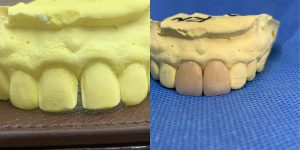
Effective Oral Hygiene Practices With Veneers
Taking care of your veneers requires consistency and proper oral hygiene habits. Here are some key points to remember:
- Brushing: Brush your teeth at least twice a day with a soft-bristled toothbrush and fluoride toothpaste.
- Flossing: Regularly floss between your teeth and around your veneers to remove plaque and food particles.
- Avoid staining foods and drinks: Limit your consumption of staining beverages like coffee, tea, and red wine. If you do indulge, rinse your mouth or brush your teeth afterward.
- Use non-abrasive toothpaste: Choose a toothpaste that is non-abrasive to protect the surface of your veneers.
- Avoid using your teeth as tools: Refrain from using your veneers to open packages or bite into hard objects, as this can damage them.
- Mouthwash: Consider incorporating an antimicrobial mouthwash into your routine to further protect against plaque and gum disease.
-
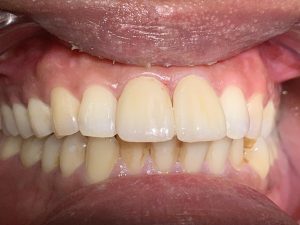
After the final work
Regular Dental Visits For Preventive Care
Regular dental visits are essential for the maintenance of your veneers and overall oral health. Here’s why:
- Professional cleaning: Dental cleanings help remove plaque and tartar buildup, which can be challenging to remove at home. This helps ensure that your veneers remain in optimal condition.
- Examination of veneers: During your dental visit, your dentist will carefully examine the condition of your veneers, checking for any signs of damage or wear. Early detection allows for timely intervention to prevent further issues.
- Oral health assessment: Your dentist will also assess the health of your gums, teeth, and overall oral cavity to identify and address any underlying issues that could affect your veneers or oral health in general.
- Professional advice: Your dentist can provide personalized tips and recommendations on how to effectively care for your veneers and maintain your oral health.
By implementing effective oral hygiene practices and regularly visiting your dentist for preventive care, you can ensure that your veneers remain beautiful and your oral health stays in top shape. Remember, taking care of your teeth and gums goes beyond aesthetics; it also contributes to your overall well-being.
So, prioritize your oral health and enjoy the full benefits of your veneers for years to come.
Debunking Common Myths And Misconceptions
Myth 1: Veneers Prevent Decay
Contrary to common belief, veneers alone do not prevent tooth decay. While veneers can provide an extra layer of protection for your teeth, proper oral hygiene is still crucial to maintain oral health. Here are key points to consider:
- Veneers are thin shells made of porcelain or composite material that are bonded to the front surface of teeth.
- Veneers can improve the appearance of teeth, but they do not provide a barrier against decay.
- Decay can still occur at the junction where the veneer meets the underlying tooth, and between adjacent teeth if oral hygiene is lacking.
- Regular brushing and flossing, along with routine visits to the dentist, are essential to prevent decay and maintain the health of your natural teeth, as well as the teeth beneath the veneers.
Myth 2: Veneers Are A Permanent Solution
While veneers are durable and long-lasting, they are not a permanent solution. Over time, veneers may need to be replaced or repaired due to normal wear and tear, staining, or damage. Here are some key points to consider:
- Veneers can last for many years with proper care and maintenance.
- However, they are subject to the same factors that affect natural teeth, such as aging, tooth grinding, and injury.
- Veneers may become discolored over time, especially if exposed to staining agents like tobacco, coffee, and red wine.
- In some cases, veneers may chip or crack and require repair or replacement.
- Regular dental check-ups are important to monitor the condition of your veneers and ensure their longevity.
Remember, veneers are a cosmetic enhancement that improves the appearance of your smile. While they can provide a beautiful transformation, it is essential to maintain good oral hygiene practices and see your dentist regularly to keep your natural teeth and veneers in optimal condition.
Choosing The Right Dentist For Veneer Placement
Choosing the right dentist is crucial when it comes to getting veneers. Veneers are a popular cosmetic dental treatment that can transform the appearance of your smile. However, if not placed correctly, veneers can lead to problems such as tooth decay and gum disease.
To ensure a successful and long-lasting veneer treatment, here are some factors to consider when selecting a dentist:
Factors To Consider When Selecting A Dentist:
- Experience and expertise: Look for a dentist who specializes in cosmetic dentistry and has extensive experience in placing veneers. This will ensure that they have the necessary skills and knowledge to provide you with the best results.
- Qualifications and credentials: Check for the dentist’s qualifications and credentials. Look for affiliations with reputable dental organizations and certifications in cosmetic dentistry.
- Patient reviews and testimonials: Read reviews and testimonials from previous patients to get an idea of the dentist’s reputation and the quality of their work.
- Technology and techniques: Inquire about the type of technology and techniques the dentist uses for veneer placement. Advanced technology and updated techniques can improve the accuracy and longevity of your veneers.
- Personalized treatment plan: A good dentist will create a personalized treatment plan based on your unique dental needs and goals. They will take into consideration factors such as tooth color, shape, size, and alignment to provide you with natural-looking results.
- Before and after photos: Ask the dentist for before and after photos of previous patients who have undergone veneer treatment. This will give you a visual representation of the dentist’s work and help you decide if their results align with your expectations.
During the consultation, it’s essential to ask the right questions to gather all the necessary information. Here are some questions you should consider asking:
Questions To Ask During The Consultation:
- How many veneer placements have you performed?
- What type of veneer material do you recommend, and why?
- What is the expected lifespan of veneers?
- Will the procedure require any tooth preparation or shaving?
- How long does the entire process take, from initial consultation to final placement?
- Are there any alternatives to veneers that may be more suitable for my dental concerns?
- What are the potential risks and complications associated with veneers?
- How will the color and shape of my veneers be chosen?
- Do you offer any warranties or guarantees on your veneer work?
- What are the maintenance and aftercare requirements for veneers?
By thoroughly evaluating these factors and asking the right questions, you can make an informed decision when choosing a dentist for veneer placement. Remember, the success of your veneer treatment relies on the expertise and skill of the dentist you select.
So take the time to research and find a dentist who can provide you with the beautiful and healthy smile you desire.
Alternatives To Veneers For A Healthier Smile
Dissatisfied with the current state of your teeth, you’ve considered getting veneers to achieve a picture-perfect smile. While veneers can provide a quick and effective way to enhance the appearance of your teeth, it’s vital to explore alternative cosmetic dentistry options before making a decision.
By weighing the pros and cons of veneers against other treatments, you can ensure the health and longevity of your smile. So, let’s dive into exploring these alternatives and find the best option for you.
Exploring Alternative Cosmetic Dentistry Options
When it comes to improving your smile, there are several alternatives to veneers that you may want to consider. These options range from less invasive treatments to more extensive procedures that address specific dental issues. Let’s explore the alternatives:
- Dental bonding: This is a procedure where a tooth-colored resin is applied and shaped to improve the appearance of a tooth. It is minimally invasive and can correct issues like chips, cracks, and gaps.
- Teeth whitening: If your main concern is tooth discoloration, professional teeth whitening may be a suitable option. This treatment involves the use of bleaching agents to lighten the shade of your teeth and achieve a brighter smile.
- Dental crowns: Similar to veneers, dental crowns can improve the appearance of teeth while also providing additional strength and protection. This solution is often used for more significant damage or extensive cosmetic changes.
- Orthodontic treatments: For those with misaligned teeth or bite issues, orthodontic treatments such as braces or clear aligners might be the best choice. These options can gradually shift teeth into the desired position, resulting in a healthier and more aesthetically pleasing smile.
- Enamel reshaping: If you have minor cosmetic imperfections like uneven tooth edges or small chips, enamel reshaping can help. This procedure involves removing a small amount of enamel to reshape the tooth, resulting in a more uniform appearance.
- Dental implants: In cases where a tooth is missing or needs to be extracted, dental implants offer a durable and natural-looking replacement. Unlike veneers, implants address both the cosmetic and functional aspects of tooth restoration.
By considering these alternative cosmetic dentistry options, you can make an informed decision that aligns with your dental needs and goals. Keep in mind that each treatment has its own set of benefits and limitations, so it’s essential to consult with a qualified dentist to determine the best course of action for your specific situation.
Remember, achieving a healthier smile should always be a priority.
Longevity And Maintaining Aesthetics
Veneers are a popular dental treatment that can dramatically improve the appearance of your teeth. They are custom-made, thin shells made of porcelain or composite resin that are bonded to the front surface of your teeth. While veneers are designed to be durable and long-lasting, it’s important to understand the factors that can affect their longevity and how to maintain their aesthetics over time.
In this section, we’ll explore the lifespan of veneers and their maintenance.
Lifespan Of Veneers
- Veneers can last for an average of 10-15 years with proper care and maintenance.
- Various factors can influence the lifespan of veneers, including oral hygiene habits, diet, teeth grinding or clenching, and regular dental check-ups.
- Porcelain veneers tend to be more durable and stain-resistant compared to composite resin veneers.
- Over time, veneers may experience wear and tear, including chipping, cracking, or staining.
Maintenance Of Veneers
- Good oral hygiene practices, such as brushing twice a day and flossing daily, are essential for maintaining the longevity of veneers.
- Avoiding excessive consumption of staining foods and beverages, such as coffee, tea, and red wine, can help prevent discoloration of veneers.
- It is recommended to use a non-abrasive toothpaste and a soft-bristled toothbrush to avoid damaging the veneer surface.
- Protecting your veneers from excessive forces, such as teeth grinding or clenching, is crucial. Wearing a nightguard can help alleviate this issue.
- Regular dental check-ups and professional cleanings are essential for detecting any issues with your veneers early on and ensuring their longevity.
- In case of damage or wear, veneers can be restored or replaced to maintain the aesthetics and functionality of your smile.
By following these maintenance guidelines and taking proper care of your veneers, you can ensure that they remain beautiful and functional for years to come. Remember, your dentist is your best resource for personalized advice on how to care for your specific veneers.
Frequently Asked Questions Of Do Your Teeth Rot Under Veneers
Can Teeth Rot Under Veneers?
Yes, there is a risk of tooth decay if proper oral hygiene is neglected. Regular brushing and flossing, along with regular dental check-ups, can prevent tooth decay and ensure the longevity of veneers.
How Can I Prevent Tooth Decay Under Veneers?
To prevent tooth decay, it’s essential to maintain good oral hygiene habits. Brush twice a day, floss daily, use fluoride toothpaste, avoid sugary foods and drinks, and visit your dentist regularly for check-ups and cleanings.
What Happens If Tooth Decay Occurs Under Veneers?
If tooth decay occurs under veneers, it can lead to various issues, such as tooth sensitivity, pain, and even infection. In such cases, the veneers may need to be removed, and the tooth will be treated before new veneers can be placed.
Can I Get Cavities Under Veneers?
Yes, cavities can still develop under veneers if proper oral hygiene practices are not followed. It’s crucial to maintain regular dental hygiene routines, including brushing, flossing, and dental check-ups, to prevent cavities from forming under veneers.
Are Veneers A Permanent Solution For Tooth Decay?
Veneers are a long-lasting solution, but they are not permanent. While veneers can protect the front surface of teeth from decay, it’s important to maintain good oral hygiene practices and visit your dentist regularly to ensure the overall health of your teeth.
Conclusion
It is important to address the concern of tooth decay under veneers. While veneers themselves do not rot, the underlying natural tooth can still be susceptible to decay if proper oral hygiene is not maintained. Regular brushing, flossing, and dental check-ups are essential in ensuring the health and longevity of both the veneers and the underlying tooth.
It is also necessary to avoid excessive consumption of sugary and acidic foods and beverages, as they can contribute to tooth decay. Dentists may recommend using fluoride toothpaste or mouth rinse to further protect against decay. If any signs of decay or damage are noticed, it is crucial to consult a dental professional immediately for proper assessment and treatment.
By practicing good oral hygiene and taking proactive steps to protect the teeth, individuals can enjoy the benefits of veneers while maintaining a healthy smile.

